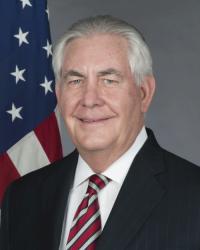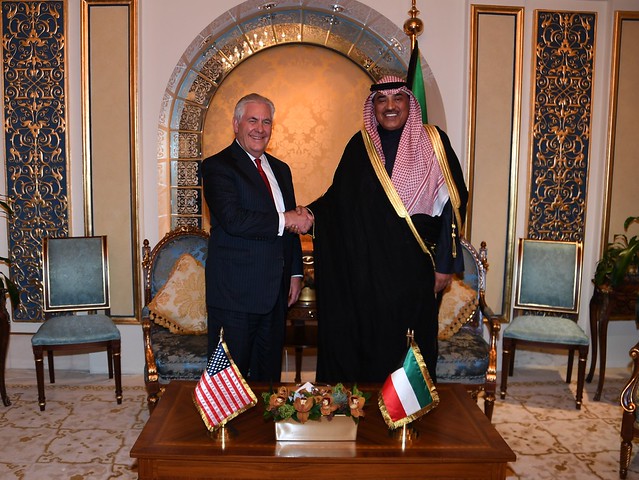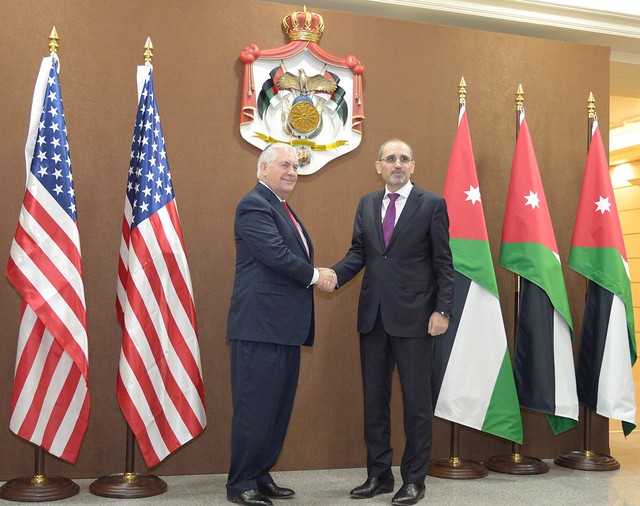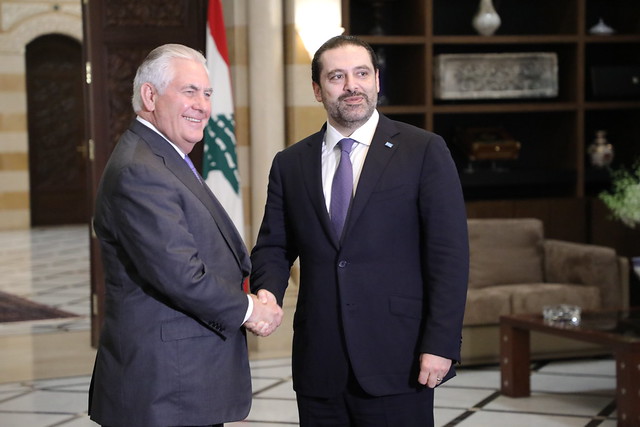 From February 11-16, Secretary of State Rex Tillerson met with officials in Egypt, Kuwait, Jordan, Lebanon and Turkey during a tour of the Middle East. Iran's rising influence in the region, the nuclear agreement, and the latest incident between Israel and Iran in Syria, were topics of discussion throughout the trip. "With respect to Iran’s broader involvement in the region, we have spoken very clearly about Iran’s destabilizing presence in Yemen, their destabilizing presence in Syria, in Lebanon, and in Iraq as well," Tillerson said in an interview with Al Hurra TV in Kuwait. "It is our view – I think it’s the view by and large of the international community – that Iran’s presence in these countries is not helpful. It does not bring stability." The following are excerpted remarks from Tillerson's trip.
From February 11-16, Secretary of State Rex Tillerson met with officials in Egypt, Kuwait, Jordan, Lebanon and Turkey during a tour of the Middle East. Iran's rising influence in the region, the nuclear agreement, and the latest incident between Israel and Iran in Syria, were topics of discussion throughout the trip. "With respect to Iran’s broader involvement in the region, we have spoken very clearly about Iran’s destabilizing presence in Yemen, their destabilizing presence in Syria, in Lebanon, and in Iraq as well," Tillerson said in an interview with Al Hurra TV in Kuwait. "It is our view – I think it’s the view by and large of the international community – that Iran’s presence in these countries is not helpful. It does not bring stability." The following are excerpted remarks from Tillerson's trip.
In Kuwait
QUESTION: Very good. Mr. Secretary, there are concerns in the region based on the last confrontation between Israel, Iran, and Syria, and the concerns based on the fear that maybe a war will break in the region and it will be a regional war. Do you share these concerns?
SECRETARY TILLERSON: Well, just prior to leaving for my trip to the region, I had a very lengthy telephone conversation with Prime Minister Netanyahu because of the strikes, and we had a long discussion around the threats that Israel is confronted with that emanate both from Lebanon due to Lebanese Hizballah, but also from Syria. We take the threats to Israel seriously and we take a view that Israel has every right to defend itself from those threats.
We are concerned about Syria not creating instability and opportunities for further threats to Israel, but also to Jordan, to Turkey, to all of its neighbors, and that’s why we will remain in Syria until ISIS is fully defeated and we are certain will not re-emerge. And we will remain engaged in the political solution for Syria, which we think is the long-term means of bringing stability to Syria and restoring Syria’s independent nature.
QUESTION: But on the ground, what is the U.S. doing specifically to contain Iran’s rising influence in Syria, in Lebanon, in Iraq, and elsewhere?
SECRETARY TILLERSON: We believe the future of responding to Iran’s influence in Syria is through the political process, through the peace process itself. Again, U.S. is present in Syria for one purpose only, and that is the defeat of ISIS, the enduring defeat of ISIS. In doing so, though, we have taken the approach that we also want to take the opportunity to ensure that fighting amongst factions inside of Syria, the re-eruption of the civil war, does not take place. And so we want to use our presence to also be a stabilizing force to support talks in Geneva under the UN Security Council resolution process, allow the Syrian people to write a new constitution, allow them to hold free and fair elections. And through that process, we believe Syria will strengthen its independence and will take its own actions to reduce and ultimately reject the influence of Iran inside of Syria.
Iran’s influence inside of Syria is not positive, it is a negative, because they bring with it instability, they bring with it violence.
QUESTION: But you’re focusing, Mr. Secretary, on defeating ISIS. And Iran, Syria, the Syrian regime, and Russia are gaining ground. What will you do in this case?
SECRETARY TILLERSON: Well, I don’t see the regime, Russia, and Iran necessarily gaining ground. I see the entire country eventually defeating ISIS. And again, what we’re encouraging Russia and others is to de-escalate the violence – once ISIS is defeated, do not promote the violence. And we’ve asked Russia to persuade the regime to stop the march and the campaign against opposition forces. They have agreed to ceasefire areas and stabilization areas, but they need to enforce those in order to create the conditions for a peaceful solution for Syria’s future.
And with respect to Iran’s broader involvement in the region, we have spoken very clearly about Iran’s destabilizing presence in Yemen, their destabilizing presence in Syria, in Lebanon, and in Iraq as well. It is our view – I think it’s the view by and large of the international community – that Iran’s presence in these countries is not helpful. It does not bring stability. It does not bring security to the citizens there. We ask Iran to withdraw and send their forces home, and that’s what we believe is the right pathway for the future.
QUESTION: But they’re doing the opposite.
SECRETARY TILLERSON: Well, they’re not going to go just because we ask them. I think ultimately the will – the will of the Syrian people and restoring a free, whole, democratic and independent Syria, that will result in them rejecting outside interference from Iran.
― Feb. 13, 2018, in an interview with Michel Ghandour of Al Hurra TV
In Jordan
QUESTION: (Via interpreter) I am Faisal Malkawi from the Jordanian Daily Al-Rai. I have a question to Your Excellencies. The first question has to do with the Syrian issue. In days or weeks, this crisis will enter its eighth year with no political solutions. Recently there was an Iranian-Syrian-Israeli clash there. How is it possible to regain control over this situation and pushing a political solution according to 2254 and the points of reference?
A second of question has to do with the developments pertaining to the political peace process. The area is very skeptical when it comes to the – and worried about the Arab-Israeli conflict, and this conflict actually generates other conflicts. We are awaiting the U.S. peace plan next month. The two-state solution is the – being contemplated in this region. How is it possible to go back to the two-state solution to end this conflict once and for all? Thank you.
SECRETARY TILLERSON: Well, we are quite concerned about the recent incident involving Israel and Iranian assets inside of Syria, and I think this again illustrates why Iran’s presence in Syria is only destabilizing to the region. We think Iran needs to withdraw its military, its militia from Syria, and allow the hope for peace process to take hold in Geneva.
― Feb. 14, 2018, remarks at Memorandum of Understanding signing and press conference with Jordanian Foreign Minister Ayman Safadi
In Lebanon
QUESTION: Good afternoon. Secretary Tillerson, if President Trump pulls out of the nuclear deal by the May deadline as he has said, critics say that would make it even easier for Iran to spread its influence in places like Lebanon and could alienate European allies whom you need in this region to counter that threat. What happens if the U.S. pulls out?
And to both of you, how serious is the oil and gas maritime dispute with Israel? And Secretary Tillerson, did you ask the Lebanese to yield part of the disputed waters to Israel in order to settle this dispute? Thank you.
SECRETARY TILLERSON: Well, with respect to the JCPOA, the Iran nuclear agreement, as the President has indicated, he would like to see the defects in that agreement addressed along with Iran’s other malign activities in the region. As such, we have been engaged with our European partners, the other signatories to the JCPOA, for some time now to chart a way forward to address these particular flaws. We’ve had very fruitful meetings with the Europeans. We’re not through with that work yet and so I don’t want to conclude or suggest any conclusion to a decision to exit the agreement. It is important that these areas be addressed, in particular the intercontinental ballistic missile program that Iran continues to carry out, as well as their export of weapons and foreign fighters that is destabilizing other countries in the region.
And I’ll go ahead: In terms of the offshore agreement, we had very good discussions in all of our meetings today. This is an extremely important issue to Lebanon, it’s important to Israel as well, to come to some agreement so that private companies can go to work offshore and determine what, in fact, might be available in terms of natural resource development and how to get started moving forward. We had a good exchange over our lunch meeting thinking about creative ideas of how to break this stalemate and move forward, and so we will continue to be very engaged with both parties, but we’ve asked no one to give up anything. Rather, we’re looking for a solution.
― Feb. 15, 2018, at a press availability with Lebanese Prime Minister Saad Hariri



